Nerine Dorman's Blog, page 78
July 4, 2013
Books of Khepera rebooted
It seems like only yesterday that I wrote my first novel, Khepera Rising, which also happened to be my debut novel with a small press operating out of the US. I remember all too well how excited I was when I signed that first contract. Hell, I was even agented for a short while. Ah, sweet memories. Needless to say, the publisher started focusing more on the romance-type stuff, and the agent and I realised we weren't a good fit for each other, and here I sit with a whole bunch of other tales sold here and there (See my new website for the whole list) ... And I've recently had the rights to my two Books of Khepera revert to me, which means I had the opportunity to shine them a little, arrange new illustrations by the rather devious Daniël Hugo and then work with my layout artist, Donnie Light, to get the whole shebang on the road.
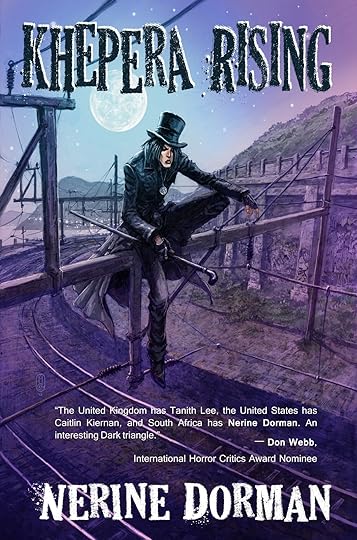 So to cut a long story short, this whole exercise of rebooting two entire novels basically kept me out of (some) mischief for all of half a year, pretty much. Am I glad that I've done this? Hellyeah. Would I do it again. Hellyeah. I enjoy the satisfaction of being in control of my backlist; as and when other titles revert to me, I'll reboot them and ensure that they remain available to my readers. It's very satisfying to be able to do so.
So to cut a long story short, this whole exercise of rebooting two entire novels basically kept me out of (some) mischief for all of half a year, pretty much. Am I glad that I've done this? Hellyeah. Would I do it again. Hellyeah. I enjoy the satisfaction of being in control of my backlist; as and when other titles revert to me, I'll reboot them and ensure that they remain available to my readers. It's very satisfying to be able to do so.
Now, without further ado, if you have yet to dip into my Books of Khepera, here's the dirty...
KHEPERA RISING #1Jamie Guillaume is the man your mother warned you about, and South Africa’s wickedest man is about to raise more than hell. Haunted by the sinister Burning One and hunted by a pack of religious extremists, Jamie’s neck-deep in trouble.
Who does a black magician turn to when it seems like his carefully constructed world’s about to disintegrate?
SmashwordsKindleKoboPrint
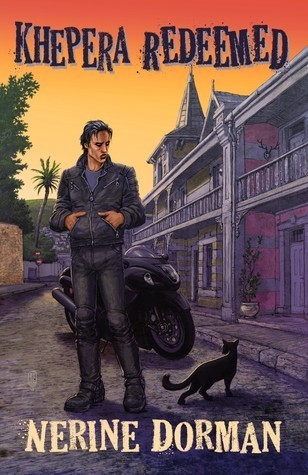 KHEPERA REDEEMED #2All Jamie wants is to get his life back on track. After all, no self-respecting occultist needs entanglement with a pack of fanatical Christo-militants. Nor does he want blood on his hands – innocent or not. But the nightmare is far from over. Now a fresh brand of hell is stalking the shadows in dreams, and young women are dying in violent ritual killings.
KHEPERA REDEEMED #2All Jamie wants is to get his life back on track. After all, no self-respecting occultist needs entanglement with a pack of fanatical Christo-militants. Nor does he want blood on his hands – innocent or not. But the nightmare is far from over. Now a fresh brand of hell is stalking the shadows in dreams, and young women are dying in violent ritual killings.
Can Jamie master his uneasy symbiosis with the sinister Burning One, get to the bottom of a rash of cult activity and stay one step ahead of a nosy reporter? All too soon the hunter becomes the hunted, and trouble with the police will be the least of Jamie’s worries.
SmashwordsKindlePrint
For those of you who're hardcore Jamie fans, yes... There is a book three. I'm about half done with it and it's waiting for a bit on the backburner while I complete two or three other titles.
 So to cut a long story short, this whole exercise of rebooting two entire novels basically kept me out of (some) mischief for all of half a year, pretty much. Am I glad that I've done this? Hellyeah. Would I do it again. Hellyeah. I enjoy the satisfaction of being in control of my backlist; as and when other titles revert to me, I'll reboot them and ensure that they remain available to my readers. It's very satisfying to be able to do so.
So to cut a long story short, this whole exercise of rebooting two entire novels basically kept me out of (some) mischief for all of half a year, pretty much. Am I glad that I've done this? Hellyeah. Would I do it again. Hellyeah. I enjoy the satisfaction of being in control of my backlist; as and when other titles revert to me, I'll reboot them and ensure that they remain available to my readers. It's very satisfying to be able to do so.Now, without further ado, if you have yet to dip into my Books of Khepera, here's the dirty...
KHEPERA RISING #1Jamie Guillaume is the man your mother warned you about, and South Africa’s wickedest man is about to raise more than hell. Haunted by the sinister Burning One and hunted by a pack of religious extremists, Jamie’s neck-deep in trouble.
Who does a black magician turn to when it seems like his carefully constructed world’s about to disintegrate?
SmashwordsKindleKoboPrint
 KHEPERA REDEEMED #2All Jamie wants is to get his life back on track. After all, no self-respecting occultist needs entanglement with a pack of fanatical Christo-militants. Nor does he want blood on his hands – innocent or not. But the nightmare is far from over. Now a fresh brand of hell is stalking the shadows in dreams, and young women are dying in violent ritual killings.
KHEPERA REDEEMED #2All Jamie wants is to get his life back on track. After all, no self-respecting occultist needs entanglement with a pack of fanatical Christo-militants. Nor does he want blood on his hands – innocent or not. But the nightmare is far from over. Now a fresh brand of hell is stalking the shadows in dreams, and young women are dying in violent ritual killings.Can Jamie master his uneasy symbiosis with the sinister Burning One, get to the bottom of a rash of cult activity and stay one step ahead of a nosy reporter? All too soon the hunter becomes the hunted, and trouble with the police will be the least of Jamie’s worries.
SmashwordsKindlePrint
For those of you who're hardcore Jamie fans, yes... There is a book three. I'm about half done with it and it's waiting for a bit on the backburner while I complete two or three other titles.
Published on July 04, 2013 10:34
July 3, 2013
Five minutes with Chris Limb, 2012 SA HorrorFest Bloody Parchment runner-up
A huge-ass welcome to Chris Limb, who's one of the runners-up in last year's SA HorrorFest Bloody Parchment short story competition. You can read his tale in The Root Cellar and Other Stories. Alibi freaked me out for a variety of reasons, the most hectic probably was the sense of how utterly bereft it made me feel by the
 So, Chris, what planted the seed for your story?
So, Chris, what planted the seed for your story?
One of my foibles is that I always sign up with a new social media service as soon as I hear about it just to see if they grab me. I tend to stick with those that work for me, one of which was Instagram. After using it for a while I found myself wondering how it “knew” where photos were originally taken, even if you posted them from elsewhere.
I then discovered EXIF data, which was the information embedded in photos, including the GPS location of where it was taken. After reading up on it, one the most interesting things for me was that it could be edited. You could embed lies in a photograph. I then wondered why someone would want a photograph to lie on his or her behalf, and the story grew from there.
What are some of the themes you treated in your tale?
From the source of inspiration I suppose the theme of lying is central to the story. From this comes morality – do the ends justify the means? Should some monsters just be killed or should a truly moral person seek another way? Things are never that simple and the experience of being human is always one of compromise, no matter the set of values to which we claim to adhere. I suppose there is also a theme of consequence – once we have decided upon a drastic course of action there will always be repercussions, even if they’re not the ones we expect. And things will never be the same again.
What are the hallmarks of a great horror/dark fantasy author and story?
I think a great horror story should disturb. It should stick with you and bother you; particular turns of phrase from it echoing around your head for weeks afterwards.
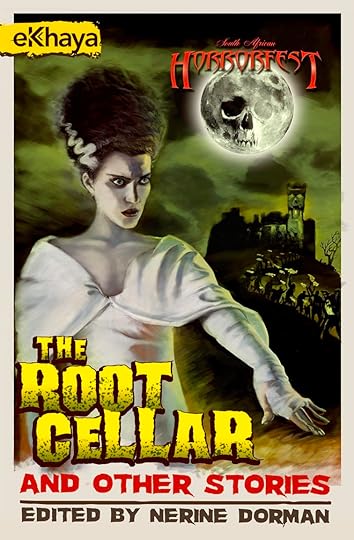 It should make you afraid. If you wake at 3.45am you should find yourself getting scared because you just remembered the story you read the other day. Of course you know that there are no ghosts but in the dead of night a good horror story should make you doubt this rational belief. So much so that you turn the light on.
It should make you afraid. If you wake at 3.45am you should find yourself getting scared because you just remembered the story you read the other day. Of course you know that there are no ghosts but in the dead of night a good horror story should make you doubt this rational belief. So much so that you turn the light on.
Sometimes it should make you wish you’d never read it in the first place, but deep down you’re glad you did.
How do you approach your creative process?
Inspiration does come from dreams I have, although often ideas seem to germinate in my mind whilst I’m awake. Something I see or hear will take root and start throwing out tendrils of “what if…”
A lot of the time these ideas will wash around in my head for ages before I write them down. I recently finished a short story the first few pages of which were in a file dated 2000!
However in recent years I have been forcing myself to write on a daily basis come what may. I have found that doing this does exercise the creative nodes and the fact of sitting down to write a story means that I have to come up with something. I started this daily writing in late 2010 in order to finish off a novel, Comeback, which I had been working on for several years – and I did so within a month or so.
During 2012’s NaNoWriMo I wrote half of the next novel in the series so this head-down-and-do-it approach does seem to work. I have to stop myself obsessing over the details and just get the writing done – I tell myself I can always fix them later.
I am an archaeologist rather than an architect when writing in that a lot of the time I don’t know what is going to happen next and so write in order to find out. However this approach doesn’t really work for short stories.
What are you working on now?
I am still submitting Comeback – which has now been through five or six revisions and is in its final form – to agents and publishers and in the meantime am working on finishing the first draft of the sequel, which is nominally called Ghostdance. Both are set in the music industry although have strong fantastical elements. I’ve also written the first couple of chapters of a SF novel dealing with parallel worlds and how we ended up in the wrong one.
I am continuing to write short stories and entering them for competitions and open calls. It is all good exercise unless it gets published and then it counts as work!
Twitter: @catmachine
Web: http://chrislimb.com
Holding page for Comeback: http://comeba.co.uk
Site for 80s pop memoir: http://toyah.org
 So, Chris, what planted the seed for your story?
So, Chris, what planted the seed for your story?One of my foibles is that I always sign up with a new social media service as soon as I hear about it just to see if they grab me. I tend to stick with those that work for me, one of which was Instagram. After using it for a while I found myself wondering how it “knew” where photos were originally taken, even if you posted them from elsewhere.
I then discovered EXIF data, which was the information embedded in photos, including the GPS location of where it was taken. After reading up on it, one the most interesting things for me was that it could be edited. You could embed lies in a photograph. I then wondered why someone would want a photograph to lie on his or her behalf, and the story grew from there.
What are some of the themes you treated in your tale?
From the source of inspiration I suppose the theme of lying is central to the story. From this comes morality – do the ends justify the means? Should some monsters just be killed or should a truly moral person seek another way? Things are never that simple and the experience of being human is always one of compromise, no matter the set of values to which we claim to adhere. I suppose there is also a theme of consequence – once we have decided upon a drastic course of action there will always be repercussions, even if they’re not the ones we expect. And things will never be the same again.
What are the hallmarks of a great horror/dark fantasy author and story?
I think a great horror story should disturb. It should stick with you and bother you; particular turns of phrase from it echoing around your head for weeks afterwards.
 It should make you afraid. If you wake at 3.45am you should find yourself getting scared because you just remembered the story you read the other day. Of course you know that there are no ghosts but in the dead of night a good horror story should make you doubt this rational belief. So much so that you turn the light on.
It should make you afraid. If you wake at 3.45am you should find yourself getting scared because you just remembered the story you read the other day. Of course you know that there are no ghosts but in the dead of night a good horror story should make you doubt this rational belief. So much so that you turn the light on.Sometimes it should make you wish you’d never read it in the first place, but deep down you’re glad you did.
How do you approach your creative process?
Inspiration does come from dreams I have, although often ideas seem to germinate in my mind whilst I’m awake. Something I see or hear will take root and start throwing out tendrils of “what if…”
A lot of the time these ideas will wash around in my head for ages before I write them down. I recently finished a short story the first few pages of which were in a file dated 2000!
However in recent years I have been forcing myself to write on a daily basis come what may. I have found that doing this does exercise the creative nodes and the fact of sitting down to write a story means that I have to come up with something. I started this daily writing in late 2010 in order to finish off a novel, Comeback, which I had been working on for several years – and I did so within a month or so.
During 2012’s NaNoWriMo I wrote half of the next novel in the series so this head-down-and-do-it approach does seem to work. I have to stop myself obsessing over the details and just get the writing done – I tell myself I can always fix them later.
I am an archaeologist rather than an architect when writing in that a lot of the time I don’t know what is going to happen next and so write in order to find out. However this approach doesn’t really work for short stories.
What are you working on now?
I am still submitting Comeback – which has now been through five or six revisions and is in its final form – to agents and publishers and in the meantime am working on finishing the first draft of the sequel, which is nominally called Ghostdance. Both are set in the music industry although have strong fantastical elements. I’ve also written the first couple of chapters of a SF novel dealing with parallel worlds and how we ended up in the wrong one.
I am continuing to write short stories and entering them for competitions and open calls. It is all good exercise unless it gets published and then it counts as work!
Twitter: @catmachine
Web: http://chrislimb.com
Holding page for Comeback: http://comeba.co.uk
Site for 80s pop memoir: http://toyah.org
Published on July 03, 2013 11:49
July 2, 2013
Shadow Woman by Linda Howard #review
Title:
Shadow Woman
Author: Linda Howard
Publisher: Piatkus, 2013
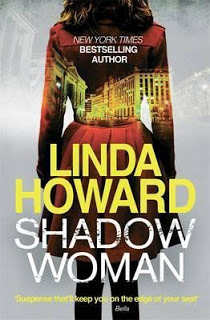 Lizzy's life is so boring and ordinary it borders on being freakishly weird because of its plainness. She has a run-of-the-mill office job, and is such a slave to routine that she appears to be more a placeholder than a person.
Lizzy's life is so boring and ordinary it borders on being freakishly weird because of its plainness. She has a run-of-the-mill office job, and is such a slave to routine that she appears to be more a placeholder than a person.
That’s until she looks in the mirror one morning and doesn’t recognise the face that gazes back at her. And so it begins. Slowly, Lizzy’s memories begin seeping back, and she realises that her entire life for the past two years has been a lie and that she has massive blanks in her memory. The only thing she’s sure of is that she’s had training in evasive driving and weapons, and has a suspicion that her life must have been very different from what it is now.
Bourne Identity much?
We’re introduced to Xavier, the male protagonist. He clearly knows what went on in Lizzy’s life before the amnesia. But I was frustrated whenever I dipped into his point of view, because I felt the author wrote the character in such a way to be deliberately mysterious and evasive – a bit of a cheap trick to create suspense.
Granted, there’s a hint in the prologue, but it’s not enough. Pacing for Shadow Woman was an issue. Most of the novel is spent with Lizzy involved in rather mundane acts. I understand that the author wished to show a gradual unfolding of her character’s self-discovery.
But by the time the real action started, the book was almost finished. I almost gain the impression that she rushed the ending as she was chasing a word count rather than developing a suitably fabulous climax. Which I expected. But didn’t get.
The plot tied up too conveniently, and I feel the characters did not develop their story arcs completely. I expected a showdown with a big bang and all I got was a whimper.
Another aspect that bothered me was the premise. I struggled to suspend disbelief as to why Lizzy was placed in her situation when a bullet would have provided a simpler, tidier (though less pleasing) option. But if you can look past the flawed premise, this novel is still a fun read in the romantic suspense genre.
Author: Linda Howard
Publisher: Piatkus, 2013
 Lizzy's life is so boring and ordinary it borders on being freakishly weird because of its plainness. She has a run-of-the-mill office job, and is such a slave to routine that she appears to be more a placeholder than a person.
Lizzy's life is so boring and ordinary it borders on being freakishly weird because of its plainness. She has a run-of-the-mill office job, and is such a slave to routine that she appears to be more a placeholder than a person.That’s until she looks in the mirror one morning and doesn’t recognise the face that gazes back at her. And so it begins. Slowly, Lizzy’s memories begin seeping back, and she realises that her entire life for the past two years has been a lie and that she has massive blanks in her memory. The only thing she’s sure of is that she’s had training in evasive driving and weapons, and has a suspicion that her life must have been very different from what it is now.
Bourne Identity much?
We’re introduced to Xavier, the male protagonist. He clearly knows what went on in Lizzy’s life before the amnesia. But I was frustrated whenever I dipped into his point of view, because I felt the author wrote the character in such a way to be deliberately mysterious and evasive – a bit of a cheap trick to create suspense.
Granted, there’s a hint in the prologue, but it’s not enough. Pacing for Shadow Woman was an issue. Most of the novel is spent with Lizzy involved in rather mundane acts. I understand that the author wished to show a gradual unfolding of her character’s self-discovery.
But by the time the real action started, the book was almost finished. I almost gain the impression that she rushed the ending as she was chasing a word count rather than developing a suitably fabulous climax. Which I expected. But didn’t get.
The plot tied up too conveniently, and I feel the characters did not develop their story arcs completely. I expected a showdown with a big bang and all I got was a whimper.
Another aspect that bothered me was the premise. I struggled to suspend disbelief as to why Lizzy was placed in her situation when a bullet would have provided a simpler, tidier (though less pleasing) option. But if you can look past the flawed premise, this novel is still a fun read in the romantic suspense genre.
Published on July 02, 2013 12:32
July 1, 2013
Why the nasty editor rejected your story
I’m one of those unfortunate souls who wear both the author and the editor hats. I know what it’s like on both ends of the scale, so I reckon it’s time I dish three of the main reasons why the nasty editor rejected your story.
The story wasn’t ready for publication
I know authors. They see a call for submissions. They get all hot and bothered and quickly dash off a short story. Then *maybe* JUST MAYBE they’ll get a friend to read it over and go over one more time to see if there are any gremlins. Then they press SEND to inflict a MS that is riddled with all sorts of awfulness.
Or the author’s been writing for a short while. They still have loads of bad habits, be it head-hopping, inability to punctuate dialogue or basic, technical writing skills that need to improve. Let’s face it. Some people aren’t natural writers. To them it’s a mechanical process, yet they yearn, with every squeeze of their little black hearts, to be the next Stephanie Meyer or Dan Brown. And yes, given time, they might overcome their technical issues, but JK Rowling and George RR Martin they are not. Yet they persist in writing stories that need more than just a little bit of spit and polish to remove the rough edges—which are many and varied.
It could also be a matter of story craft, of developing characters, balancing narrative summary with action sequences. Perhaps a story has reams and reams of exposition. These are all things you learn as you gain more experience.
But with all the aforementioned issues, the plain and simple reason why the editor rejected these stories was because they simply weren’t ready for publication. It’s not always easy seeing what’s wrong with your own writing, but that’s why it’s important to learn whenever you receive critique from your fellow writers or, if you’re even luckier, have an editor write you a personalized rejection letter.
It bored me
Sometimes an editor will read a story and it just won’t hook them at all. I’m sure you’ve heard agents and editors say this before: This is a highly subjective business, and it doesn’t reflect on your personal capabilities but…
There’s always that big BUT (or a butt if you're feeling particularly nasty). Plainly put, an atheist editor won’t relate to Christian inspirational fiction, and there’s a good chance a romance fan won’t want to read hardcore military SF.
Be honest with yourself. Are your characters three-dimensional? Does the dialogue flow naturally? Are the action sequences believable? Are you certain your premise isn’t just another Twilight clone?
Everyone’s got likes and dislikes, and you need to understand that you’re not going to please all of the people all of the time, no matter what you do.
Follow submission guidelines
It’s simple. Whether you are querying an agent or submitting a short story to an anthology, READ THE SUBMISSION GUIDELINES AND FOLLOW THEM.
You have no idea how many authors submit material that is not to spec. I’ve had 23 000-word novellas submitted to an open call with a limit of no more than 3 500 words. And I’ve had Christian inspirational fiction submitted to a horror anthology (I kid you not). Not to mention thinly veiled flash fiction based on whatever TV series or movie is popular at the time. Don’t even get me started on The Walking Dead or the Saw films… These are out-and-out rejections. Why? Because you evidently don’t read. That’s why.
Lastly, if an editor rejects your story, don’t try to get snippy with comments like “Ah well, it’s your loss” or “You don’t know quality when you see it”. (Yes, I’ve had THOSE authors too.) You’re really not doing yourself a service, and if I see your name crop up again in future calls, I’ll hit the delete button without bothering to read.

* * * *
[deep breath and tucks away the spleen]
I am currently looking after the Tales of Darkness and Dismay imprint (Dark Continents Publishing) and am open to queries of short story anthologies and novellas. From time to time I also take on select clients for developmental edits. Anthologies I edit include the SA HorrorFest Bloody Parchment (eKhaya, Random House Struik), Dark Harvest (Dark Continents) and The Sea (Dark Continents). Query me at nerinedorman@gmail.com
The story wasn’t ready for publication
I know authors. They see a call for submissions. They get all hot and bothered and quickly dash off a short story. Then *maybe* JUST MAYBE they’ll get a friend to read it over and go over one more time to see if there are any gremlins. Then they press SEND to inflict a MS that is riddled with all sorts of awfulness.
Or the author’s been writing for a short while. They still have loads of bad habits, be it head-hopping, inability to punctuate dialogue or basic, technical writing skills that need to improve. Let’s face it. Some people aren’t natural writers. To them it’s a mechanical process, yet they yearn, with every squeeze of their little black hearts, to be the next Stephanie Meyer or Dan Brown. And yes, given time, they might overcome their technical issues, but JK Rowling and George RR Martin they are not. Yet they persist in writing stories that need more than just a little bit of spit and polish to remove the rough edges—which are many and varied.
It could also be a matter of story craft, of developing characters, balancing narrative summary with action sequences. Perhaps a story has reams and reams of exposition. These are all things you learn as you gain more experience.
But with all the aforementioned issues, the plain and simple reason why the editor rejected these stories was because they simply weren’t ready for publication. It’s not always easy seeing what’s wrong with your own writing, but that’s why it’s important to learn whenever you receive critique from your fellow writers or, if you’re even luckier, have an editor write you a personalized rejection letter.
It bored me
Sometimes an editor will read a story and it just won’t hook them at all. I’m sure you’ve heard agents and editors say this before: This is a highly subjective business, and it doesn’t reflect on your personal capabilities but…
There’s always that big BUT (or a butt if you're feeling particularly nasty). Plainly put, an atheist editor won’t relate to Christian inspirational fiction, and there’s a good chance a romance fan won’t want to read hardcore military SF.
Be honest with yourself. Are your characters three-dimensional? Does the dialogue flow naturally? Are the action sequences believable? Are you certain your premise isn’t just another Twilight clone?
Everyone’s got likes and dislikes, and you need to understand that you’re not going to please all of the people all of the time, no matter what you do.
Follow submission guidelines
It’s simple. Whether you are querying an agent or submitting a short story to an anthology, READ THE SUBMISSION GUIDELINES AND FOLLOW THEM.
You have no idea how many authors submit material that is not to spec. I’ve had 23 000-word novellas submitted to an open call with a limit of no more than 3 500 words. And I’ve had Christian inspirational fiction submitted to a horror anthology (I kid you not). Not to mention thinly veiled flash fiction based on whatever TV series or movie is popular at the time. Don’t even get me started on The Walking Dead or the Saw films… These are out-and-out rejections. Why? Because you evidently don’t read. That’s why.
Lastly, if an editor rejects your story, don’t try to get snippy with comments like “Ah well, it’s your loss” or “You don’t know quality when you see it”. (Yes, I’ve had THOSE authors too.) You’re really not doing yourself a service, and if I see your name crop up again in future calls, I’ll hit the delete button without bothering to read.

* * * *
[deep breath and tucks away the spleen]
I am currently looking after the Tales of Darkness and Dismay imprint (Dark Continents Publishing) and am open to queries of short story anthologies and novellas. From time to time I also take on select clients for developmental edits. Anthologies I edit include the SA HorrorFest Bloody Parchment (eKhaya, Random House Struik), Dark Harvest (Dark Continents) and The Sea (Dark Continents). Query me at nerinedorman@gmail.com
Published on July 01, 2013 13:50
June 27, 2013
Five minutes with Stephen Hewitt, 2012 Bloody Parchment finalist
A big welcome to Stephen Hewitt, whose story Kiss the Butcher's Daughter unsettled me quite a bit, which is why I reckon it deserved to be included in this year's SA HorrorFest Bloody Parchment anthology. But I'll leave it up to him to tell us a little more.
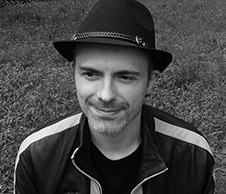 What planted the seed for your story?
What planted the seed for your story?
A deep love of bacon.
That, or the needle-like abdomen of a brain-injecting, story wasp.
What are some of the themes you treated in your tale?
Those themes that affected my dimly remembered school days: of boys generally regarding girls as silly one day, and rather more interesting the next; the sudden jump in sophistication and maturity that girls seem to show in advance of boys; and the general cruelty of schoolyard rumour, naivety and youth. Damn it, yeah, I was so bullied (sob). I still have no idea what girls think of boys. Should I ever find out, I know you will have me silenced…
What are the hallmarks of a great horror/dark fantasy author and story?
An aquiline profile, a ‘tache and the ability to look good smoking a pipe on the dust jacket. And that’s just La Femme Horrotica. Failing that, a great author can write something that’s about people first, and parasitical, blood-sucking tentacle-ness, second. I love a twist on reality. I’m not interested in brains exploding – unless it’s about to be my own.
…
It’s not about to be my own, is it?
How do you approach your creative process?
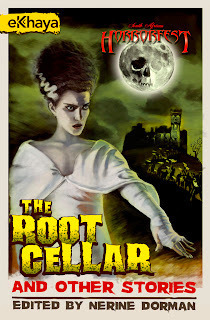 Firstly I partake of the black lotus, Chimerae, Lovecraftia, that grows exclusively on those tundrous and necrotic slopes of The Mountains of Madness. Or, eschewing effusive adjectiva, I start off with as random a prompt as I can come up with. Then, I try and sit beside you as you read, and write as quickly, and as much off the top of my head, as I can. If I’m lucky, I get that feeling of reading a story as I write, and I’ll finish just before you do. In essence, I’m a reader in charge of the story factory. What fun. When it clicks, it’s 10% writing and then 90% editing. When it doesn’t click it’s 90% writing and then 90% editing.
Firstly I partake of the black lotus, Chimerae, Lovecraftia, that grows exclusively on those tundrous and necrotic slopes of The Mountains of Madness. Or, eschewing effusive adjectiva, I start off with as random a prompt as I can come up with. Then, I try and sit beside you as you read, and write as quickly, and as much off the top of my head, as I can. If I’m lucky, I get that feeling of reading a story as I write, and I’ll finish just before you do. In essence, I’m a reader in charge of the story factory. What fun. When it clicks, it’s 10% writing and then 90% editing. When it doesn’t click it’s 90% writing and then 90% editing.
What are you working on now?
I’ve spent a while doing flash fiction, short stories and writing for computer games. I’m now trying to plan a novel, which feels like I’m stuffing a 40lb octopus into a ukulele case. Or reconstructing a Boeing 707 from a crash site: I have all these bits and no idea what happened, with enough junk left over for four other planes...
And a combine harvester.
And a tandem bicycle.
And a small collection of fondue forks.
(Yeah, like most of my fiction, it was a weird accident.)
Planning ‘large writing’ feels about as far from writing as I can imagine. I have multiple works in the offing to prevent my reader’s soul weeping thick, black tears of printer’s ink. Or is that Kindle pixels?
Ta, da.
Enough, already, I’m off for a bacon roll.
 What planted the seed for your story?
What planted the seed for your story?A deep love of bacon.
That, or the needle-like abdomen of a brain-injecting, story wasp.
What are some of the themes you treated in your tale?
Those themes that affected my dimly remembered school days: of boys generally regarding girls as silly one day, and rather more interesting the next; the sudden jump in sophistication and maturity that girls seem to show in advance of boys; and the general cruelty of schoolyard rumour, naivety and youth. Damn it, yeah, I was so bullied (sob). I still have no idea what girls think of boys. Should I ever find out, I know you will have me silenced…
What are the hallmarks of a great horror/dark fantasy author and story?
An aquiline profile, a ‘tache and the ability to look good smoking a pipe on the dust jacket. And that’s just La Femme Horrotica. Failing that, a great author can write something that’s about people first, and parasitical, blood-sucking tentacle-ness, second. I love a twist on reality. I’m not interested in brains exploding – unless it’s about to be my own.
…
It’s not about to be my own, is it?
How do you approach your creative process?
 Firstly I partake of the black lotus, Chimerae, Lovecraftia, that grows exclusively on those tundrous and necrotic slopes of The Mountains of Madness. Or, eschewing effusive adjectiva, I start off with as random a prompt as I can come up with. Then, I try and sit beside you as you read, and write as quickly, and as much off the top of my head, as I can. If I’m lucky, I get that feeling of reading a story as I write, and I’ll finish just before you do. In essence, I’m a reader in charge of the story factory. What fun. When it clicks, it’s 10% writing and then 90% editing. When it doesn’t click it’s 90% writing and then 90% editing.
Firstly I partake of the black lotus, Chimerae, Lovecraftia, that grows exclusively on those tundrous and necrotic slopes of The Mountains of Madness. Or, eschewing effusive adjectiva, I start off with as random a prompt as I can come up with. Then, I try and sit beside you as you read, and write as quickly, and as much off the top of my head, as I can. If I’m lucky, I get that feeling of reading a story as I write, and I’ll finish just before you do. In essence, I’m a reader in charge of the story factory. What fun. When it clicks, it’s 10% writing and then 90% editing. When it doesn’t click it’s 90% writing and then 90% editing. What are you working on now?
I’ve spent a while doing flash fiction, short stories and writing for computer games. I’m now trying to plan a novel, which feels like I’m stuffing a 40lb octopus into a ukulele case. Or reconstructing a Boeing 707 from a crash site: I have all these bits and no idea what happened, with enough junk left over for four other planes...
And a combine harvester.
And a tandem bicycle.
And a small collection of fondue forks.
(Yeah, like most of my fiction, it was a weird accident.)
Planning ‘large writing’ feels about as far from writing as I can imagine. I have multiple works in the offing to prevent my reader’s soul weeping thick, black tears of printer’s ink. Or is that Kindle pixels?
Ta, da.
Enough, already, I’m off for a bacon roll.
Published on June 27, 2013 13:22
June 24, 2013
Five minutes with Lee Mather, 2012 Bloody Parchment finalist
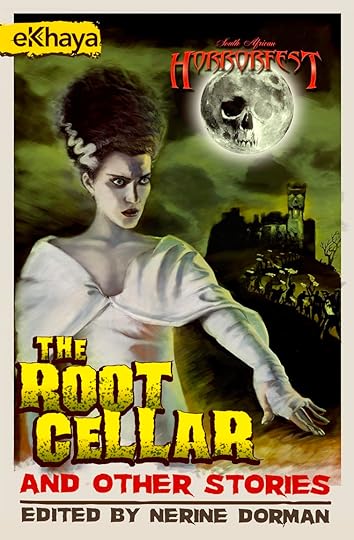 Lee Mather seems to be turning into regular for Bloody Parchment. This year his story, Jamie's Song, met with the judges' approval and I'm happy to have him over today to chat a little more about his contribution, and how he approaches the art of writing.
Lee Mather seems to be turning into regular for Bloody Parchment. This year his story, Jamie's Song, met with the judges' approval and I'm happy to have him over today to chat a little more about his contribution, and how he approaches the art of writing.What planted the seed for your story?
As bizarre as this seems, Jamie's Song was inspired by Kate Bush! The video for her song Experiment IV had a profound effect on me when I was younger. So did Babooshka but for different reasons. With regard to inspiration, the notion of "a sound that could kill" stuck with me and I shaped it into something relevant to a music loving Mancunian.
What are some of the themes you treated in your tale?
Death. Grief. The influence of music.
What are the hallmarks of a great horror/dark fantasy author and story?
I wish I knew. Perhaps a question for Joe Hill.

How do you approach your creative process?
With a blank page and a flashing cursor. I write lots of notes, sometimes an outline. I'll read up on themes relevant to the piece and I try my hardest to evolve ideas into pulling together a world that, as a reader, I would want to be a part of.
What are you working on now?
Right now, these answers. Sometime soon, a debut novel. I've had some success with shorter fiction and I'd love to replicate that with something longer.
www.leemather.org.uk has it all. You can Tweet me, Friend me, and even buy my books from there. It hosts some free stuff too if you'd like to try before you buy.
Published on June 24, 2013 12:22
June 20, 2013
Simon Dewar, 2012 SA HorrorFest Bloody Parchment finalist
Simon Dewar started stalking following me on Twitter a while back. He was one of THOSE guys who doesn't stop asking questions. I also suspect he might be one of THOSE guys who're worth keeping an eye on because he's going to end up doing something really exciting soon. You have been warned. His short story, The Kettle, which appears in this year's Bloody Parchment: The Root Cellar, really creeps me out because it makes me consider how we fall into a routine... and how that routine is a unique brand of hell in itself.
So, Simon, what planted the seed for your story?
 The seed for my story was definitely the birth of my daughter a couple of months earlier. I honestly felt that for about two months I'd lived on no sleep and far too much coffee and that I was just stumbling from day to day, event to event in some kinda of weird haze of caffeine induced insomnia, dirty nappies and work! As joyous a time as it was, it was also a huge and emotional life adjustment to be made. All of a sudden you can't just sleep in because a baby need to a bottle at 2am or you can't take a day off work because of all the new extra baby expenses and there's no time for holidays or date nights with the Mrs. RESPONSIBILITY --- EEK! I tried to capture some of these feelings and I applied the obligatory "What's the worst that could happen" or a "How can I make this sound *even* worse/harder than it already is?!"
The seed for my story was definitely the birth of my daughter a couple of months earlier. I honestly felt that for about two months I'd lived on no sleep and far too much coffee and that I was just stumbling from day to day, event to event in some kinda of weird haze of caffeine induced insomnia, dirty nappies and work! As joyous a time as it was, it was also a huge and emotional life adjustment to be made. All of a sudden you can't just sleep in because a baby need to a bottle at 2am or you can't take a day off work because of all the new extra baby expenses and there's no time for holidays or date nights with the Mrs. RESPONSIBILITY --- EEK! I tried to capture some of these feelings and I applied the obligatory "What's the worst that could happen" or a "How can I make this sound *even* worse/harder than it already is?!"
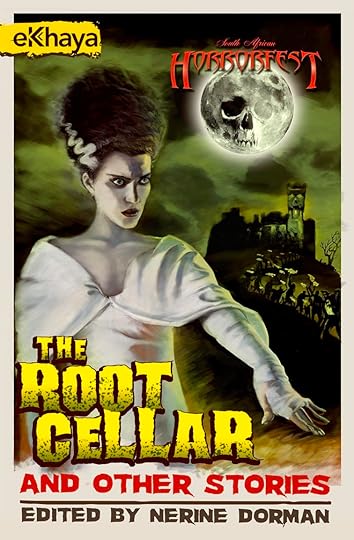 What are some of the themes you treated in your tale?
What are some of the themes you treated in your tale?
I guess the themes that I touched on were probably male postnatal depression, caffeine addiction/sleep deprivation and that overwhelming feeling of just barely keeping your head above water as you plow through the drudgery of every day life.
What are the hallmarks of a great horror/dark fantasy author and story?
Hallmarks for a great horror author is someone who can take something that we all deal with or all understand or have all experience and really bring out that which is scary or terrible about it. Even if its a good experience, they show you it from an angle that freaks you out or they invert the whole thing and what should be good, becomes blasphemous. From a technical perspective they understand the nuts and bolts of what inspires fear and terror and can artfully use it to instill in the reader that emotion. I read and write horror because basically... I'm shit scared of everything.. When I read a scary book or scary movie, I face those fears and I win, in the process I learn about myself, fellow man and the human condition. The great horror author can provide this experience.
Hallmarks for a great horror story for me are, basically, whether they really made me genuinely fearful.
Did my heart race, or did I get sweaty palms?
Did I sit there and think "I don't like where this is headed..." ?
Did I think "Holy shit... I wonder what is going to happen next" ?
Did I think "Noooo, dont go into the cellar... NEVER GO INTO THE CELLAR!"
or maybe: "Oh. My. God. I bet that hurt!" or "What the ACTUAL fuck ?!?"
If you made me think some these kind of things, you've written a good horror tale. Above all, what I love the most is when a writer builds up tension to a fever pitch and send you out with a bang. Recent examples of stories I've read that did this for me was Hide and Seek by Jack Ketchum, Hell House by Richard Matheson. The Books of Blood by Clive Barker were pretty decent as well.
How do you approach your creative process?
I wish I knew a real answer to this question. Some writers put everything they think of down in a notebook they carry with them. Stephen King once said that this was the best way to immortalise bad ideas and I COMPLETELY agree with him. I tried doing this and I just end up with scribbles of bullshit ideas. Every story that I've written that I've finished, seriously enjoyed writing and hasn't totally sucked was something that came on me like a bolt of lightning when I was having a shower or something mundane. One idea that I have for a novel came to me when I was standing in line at a cafe reading a tweet by John Scalzi. BOOM! All of a sudden I have an image of the protagonist in my head, his predicament and a fair idea about something terrible that's going to happen to him.
What are you working on now?
I've just finished a horror tale called the House of Waite which I submitted to the Fearful Symmetries anthology being edited by the illustrious Ellen Datlow.
I'm working on a pirate tale which I describe as "part Final Destination, part Pirates of the Caribbean, part Happy Feet". Hopefully I finish it shortly and submit it to "The Sea" anthology being put out Dark Continents Publishing. I've also started on the first few chapters of my first novel.
You can catch me on twitter: @herodfel
So, Simon, what planted the seed for your story?
 The seed for my story was definitely the birth of my daughter a couple of months earlier. I honestly felt that for about two months I'd lived on no sleep and far too much coffee and that I was just stumbling from day to day, event to event in some kinda of weird haze of caffeine induced insomnia, dirty nappies and work! As joyous a time as it was, it was also a huge and emotional life adjustment to be made. All of a sudden you can't just sleep in because a baby need to a bottle at 2am or you can't take a day off work because of all the new extra baby expenses and there's no time for holidays or date nights with the Mrs. RESPONSIBILITY --- EEK! I tried to capture some of these feelings and I applied the obligatory "What's the worst that could happen" or a "How can I make this sound *even* worse/harder than it already is?!"
The seed for my story was definitely the birth of my daughter a couple of months earlier. I honestly felt that for about two months I'd lived on no sleep and far too much coffee and that I was just stumbling from day to day, event to event in some kinda of weird haze of caffeine induced insomnia, dirty nappies and work! As joyous a time as it was, it was also a huge and emotional life adjustment to be made. All of a sudden you can't just sleep in because a baby need to a bottle at 2am or you can't take a day off work because of all the new extra baby expenses and there's no time for holidays or date nights with the Mrs. RESPONSIBILITY --- EEK! I tried to capture some of these feelings and I applied the obligatory "What's the worst that could happen" or a "How can I make this sound *even* worse/harder than it already is?!" What are some of the themes you treated in your tale?
What are some of the themes you treated in your tale? I guess the themes that I touched on were probably male postnatal depression, caffeine addiction/sleep deprivation and that overwhelming feeling of just barely keeping your head above water as you plow through the drudgery of every day life.
What are the hallmarks of a great horror/dark fantasy author and story?
Hallmarks for a great horror author is someone who can take something that we all deal with or all understand or have all experience and really bring out that which is scary or terrible about it. Even if its a good experience, they show you it from an angle that freaks you out or they invert the whole thing and what should be good, becomes blasphemous. From a technical perspective they understand the nuts and bolts of what inspires fear and terror and can artfully use it to instill in the reader that emotion. I read and write horror because basically... I'm shit scared of everything.. When I read a scary book or scary movie, I face those fears and I win, in the process I learn about myself, fellow man and the human condition. The great horror author can provide this experience.
Hallmarks for a great horror story for me are, basically, whether they really made me genuinely fearful.
Did my heart race, or did I get sweaty palms?
Did I sit there and think "I don't like where this is headed..." ?
Did I think "Holy shit... I wonder what is going to happen next" ?
Did I think "Noooo, dont go into the cellar... NEVER GO INTO THE CELLAR!"
or maybe: "Oh. My. God. I bet that hurt!" or "What the ACTUAL fuck ?!?"
If you made me think some these kind of things, you've written a good horror tale. Above all, what I love the most is when a writer builds up tension to a fever pitch and send you out with a bang. Recent examples of stories I've read that did this for me was Hide and Seek by Jack Ketchum, Hell House by Richard Matheson. The Books of Blood by Clive Barker were pretty decent as well.
How do you approach your creative process?
I wish I knew a real answer to this question. Some writers put everything they think of down in a notebook they carry with them. Stephen King once said that this was the best way to immortalise bad ideas and I COMPLETELY agree with him. I tried doing this and I just end up with scribbles of bullshit ideas. Every story that I've written that I've finished, seriously enjoyed writing and hasn't totally sucked was something that came on me like a bolt of lightning when I was having a shower or something mundane. One idea that I have for a novel came to me when I was standing in line at a cafe reading a tweet by John Scalzi. BOOM! All of a sudden I have an image of the protagonist in my head, his predicament and a fair idea about something terrible that's going to happen to him.
What are you working on now?
I've just finished a horror tale called the House of Waite which I submitted to the Fearful Symmetries anthology being edited by the illustrious Ellen Datlow.
I'm working on a pirate tale which I describe as "part Final Destination, part Pirates of the Caribbean, part Happy Feet". Hopefully I finish it shortly and submit it to "The Sea" anthology being put out Dark Continents Publishing. I've also started on the first few chapters of my first novel.
You can catch me on twitter: @herodfel
Published on June 20, 2013 12:37
June 19, 2013
Conqueror by Conn Iggulden #review
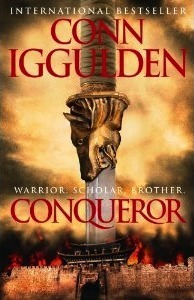 Title:
Conqueror
Title:
Conqueror
Author: Conn Iggulden
Publisher: HarperCollins, 2011
Long ago, nothing could have been more frightening than having a Mongol horde descend upon a town or city. But these warriors were so much more than just a marauding force on the landscapes of history. Not only did they rule a massive empire, they also assimilated many cultures and their actions still reverberate throughout history. Conqueror concludes Conn Iggulden’s series based on the life of Genghis Khan and his heirs.
The novel concerns itself mainly with the doings of the legendary Kublai Khan, who not only established himself as an emperor in the Far East, but also won a bloody civil war to declare himself supreme leader of his people. Kublai Khan is portrayed as a scholar-turned-warrior, who draws upon his somewhat academic upbringing to outsmart his rivals.
And what a ride it is. Having read the preceding Empire of Silver , I knew what to expect, but looked forward to Conqueror mainly to see how the story of the Khans turned out. For anyone who is interested in history, Iggulden certainly offers a masterful retelling and if, like me, you weren’t au fait with the details, the outcome will result in a nail-biting journey.
If military strategy, warfare and violence aren’t quite your thing, then this saga is probably not for you. The Mongols didn’t shrink from spilling blood – sometimes gratuitously so – and their acts of cruelty were tremendous.
Though Iggulden admits to taking liberties with actual history, he definitely succeeds in whetting my appetite in delving deeper into this period and I walk away with a far clearer idea of the Mongol people. Granted, pacing issues are a challenge when writing more or less historically accurate fiction, but Iggulden manages a far tighter result than in Empire of Silver.
At times I did feel that the author was manipulating readers’ opinions to prefer Kublai over his brothers (they all seem to possess some sort of fatal flaw), but that matters little in the bigger picture; this is still an enjoyable story which vividly brings history to life. Though Conqueror finishes before Kublai Khan’s rule reaches its peak, it’s a fitting and satisfying end to an action-packed series
Published on June 19, 2013 12:01
June 18, 2013
Five minutes with Anna Reith, 2012 Bloody Parchment runner-up
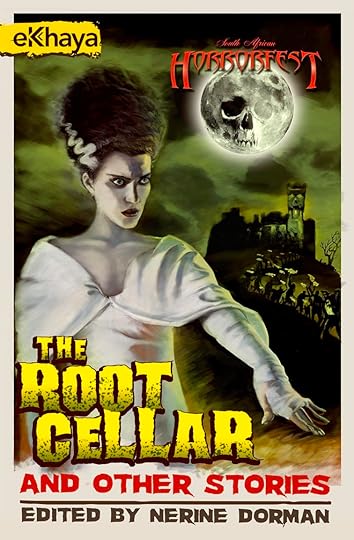 I must admit I become a bit of a fangrrrl whenever I see anything with Anna Reith's name on it. She really is that good, and I just about faint when I see her submissions in my inbox. So it came to no surprise when she turned out to be a runner-up in last year's Bloody Parchment short story competition. So, a big welcome to Anna on my blog.
I must admit I become a bit of a fangrrrl whenever I see anything with Anna Reith's name on it. She really is that good, and I just about faint when I see her submissions in my inbox. So it came to no surprise when she turned out to be a runner-up in last year's Bloody Parchment short story competition. So, a big welcome to Anna on my blog.What planted the seed for your story?
Courting Seraphs is loosely inspired by the concepts found in On the Origin of the World, one of the Nag Hammadi scriptures, which presents a very different version of the creation story to that found in the Bible. I wanted to take some of those ideas and explore what happened if, not only were they true, but one person was caught up in them, holding secrets that can never be shared. So… a bit like a spy thriller, but with Gnostic philosophy instead of sensitive government information.
What are some of the themes you treated in your tale?
There is plenty of material out there in fantasy, horror, and weird fiction in terms of immortality and timelessness. I wanted to touch on those things in Courting Seraphs, but from a slightly different angle. Today, we’re bombarded with a ridiculously huge volume of information, images, and experiences. Through technology, we have access to more information than we could assimilate in a lifetime, and I think that’s something that’s fundamentally overlooked in stories that deal with immortality. As human beings, do we have a finite limit for how much we can experience, and how much we can hold in our heads? And, if we cross that limit, how long will it be until we come apart at the seams?
 What are the hallmarks of a great horror/dark fantasy author and story?
What are the hallmarks of a great horror/dark fantasy author and story? What I love about horror and dark fantasy is the breadth of possibilities. We are very complex creatures and—in the right light—we’re capable of making almost anything macabre, just by the way we think about it. The shadows around the campfire, the knotted, finger-like twigs of trees against the window… these are all creations of the human mind. I think my favourite creepy tales are the ones that explore that potential within us, and let the strange and the unseen leach into the everyday. After all, what’s scarier than suddenly realising the malign in something mundane?
How do you approach your creative process?
With coffee. No… well, yes. Ideas are a permanent swirl, and I am forever scribbling notes down on the backs of things, but as soon as I have the basic shape of a story—or at least a firm grasp on one scene that the rest of it will grow from—I like to sit down and beat it into shape. As I suffer from CFS/M.E., that can be quite laborious, but I think there’s no substitute for applying proverbial glue to the seat of the pants and getting on with it. I really only use outlines occasionally, preferring to let tales grow organically and, because so much of my work tends to involve strong characterisation, I often find that it’s the way people spark off each other that drives my stories forward.
What are you working on now?
Right now, I’m working on a handful of very interesting projects, including a dark fantasy novel titled Making the Days, which—a little like Courting Seraphs—deals a lot with what’s real, what’s not real, and the places people fall in between. I’m also working on the first in a sci-fi series set in a large and complex universe; something of a labour of love, as the original unfinished manuscripts were left to me by my late cousin, who had been working on them for several years. I will have a poetry collection out later this year and, though it’s probably a bit early to really announce it, I have just started preliminary work on a sequel to my genre-bending glam-rock-paranormal-murder-mystery, Dead in Time, which is currently available to read for free on Wattpad, where I’ve been a featured author recently.
As ever, further details on what I’m up to can be found on my website, www.annareith.co.uk, where I have some further free reads available. Both Dead in Time and Black Ice: collected stories , a compendium of dark short fiction, are currently available in digital and print formats.
You can also find me on tumblr and Wattpad.
Published on June 18, 2013 12:05
June 17, 2013
Icy Sedgwick, Bloody Parchment 2012 finalist
The talented Icy Sedgwick is not only drop-dead gorgeous, but she writes some of the most charming, inventive and enthralling stories I've encountered in ages. She's a regularly contributor to the #FridayFlash phenomenon, and I'm overjoyed that she submitted her story, Protection, to the Bloody Parchment short story competition, and that it was well received by the judges. Welcome, Icy! What planted the seed for your story?
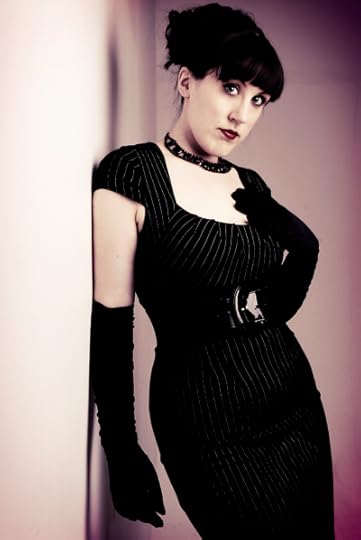 I was listening to a piece by Mussorgsky and it ended with a tolling bell. I just sat back and listened, and the mental image I got was of a small village, besieged by some menace, and the bell was a warning that trouble was coming. The rest of it just sprang from that! I'm not particularly musical but sound has a very specific way of generating images in my head that I can turn into stories.
I was listening to a piece by Mussorgsky and it ended with a tolling bell. I just sat back and listened, and the mental image I got was of a small village, besieged by some menace, and the bell was a warning that trouble was coming. The rest of it just sprang from that! I'm not particularly musical but sound has a very specific way of generating images in my head that I can turn into stories.
What are some of the themes you treated in your tale?
I don't specifically think about themes while I'm writing, but looking back on the story, I suppose my biggest concern was that of the outsider, and how they can be treated by their society – until their unique skillset is required by that society, and the community expect help. Should the outsider get involved anyway, or refuse the help that they never had?
What are the hallmarks of a great horror/dark fantasy author and story?
I think imagination is key to dark fantasy, and a good story should take you somewhere that you've never been before. Horror should be something that above all horrifies. Some people seem to think that means being gory or explicit, and while that's part of horror, that's also the kind of thing to which you can become desensitised, so I feel that telling a chilling story is harder. Not everyone is going to be grossed out by something gory, so you need to find that key to tapping into what freaks someone out.
How do you approach your creative process?
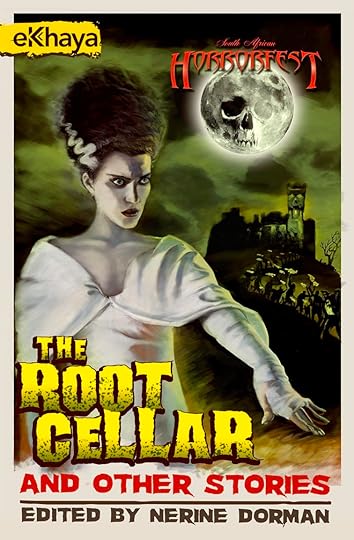 It depends on what I'm doing, really! But nine times out of ten, I'll come up with an idea, roughly sketch out the beginning, middle and end, and then just go for it. I let it all splurge out, and then I go back and tidy it up. I've tried outlining my work but I get so tied up in knots over it that I end up writing nothing at all, so it's better for me to just have a rough idea where I want to go.
It depends on what I'm doing, really! But nine times out of ten, I'll come up with an idea, roughly sketch out the beginning, middle and end, and then just go for it. I let it all splurge out, and then I go back and tidy it up. I've tried outlining my work but I get so tied up in knots over it that I end up writing nothing at all, so it's better for me to just have a rough idea where I want to go.
What are you working on now?
I'm in the last edits stage of a dark fantasy novella called The Necromancer's Apprentice, which is essentially what might have happened if Disney had swapped their sorceror for a necromancer, and the helpful brooms for bloodthirsty mummies!
You can follow me on Twitter @icypop, and both my pulp Western novella, The Guns of Retribution , and my collection of shourt stories, Checkmate & Other Stories , are available for Kindle from Amazon.
 I was listening to a piece by Mussorgsky and it ended with a tolling bell. I just sat back and listened, and the mental image I got was of a small village, besieged by some menace, and the bell was a warning that trouble was coming. The rest of it just sprang from that! I'm not particularly musical but sound has a very specific way of generating images in my head that I can turn into stories.
I was listening to a piece by Mussorgsky and it ended with a tolling bell. I just sat back and listened, and the mental image I got was of a small village, besieged by some menace, and the bell was a warning that trouble was coming. The rest of it just sprang from that! I'm not particularly musical but sound has a very specific way of generating images in my head that I can turn into stories.What are some of the themes you treated in your tale?
I don't specifically think about themes while I'm writing, but looking back on the story, I suppose my biggest concern was that of the outsider, and how they can be treated by their society – until their unique skillset is required by that society, and the community expect help. Should the outsider get involved anyway, or refuse the help that they never had?
What are the hallmarks of a great horror/dark fantasy author and story?
I think imagination is key to dark fantasy, and a good story should take you somewhere that you've never been before. Horror should be something that above all horrifies. Some people seem to think that means being gory or explicit, and while that's part of horror, that's also the kind of thing to which you can become desensitised, so I feel that telling a chilling story is harder. Not everyone is going to be grossed out by something gory, so you need to find that key to tapping into what freaks someone out.
How do you approach your creative process?
 It depends on what I'm doing, really! But nine times out of ten, I'll come up with an idea, roughly sketch out the beginning, middle and end, and then just go for it. I let it all splurge out, and then I go back and tidy it up. I've tried outlining my work but I get so tied up in knots over it that I end up writing nothing at all, so it's better for me to just have a rough idea where I want to go.
It depends on what I'm doing, really! But nine times out of ten, I'll come up with an idea, roughly sketch out the beginning, middle and end, and then just go for it. I let it all splurge out, and then I go back and tidy it up. I've tried outlining my work but I get so tied up in knots over it that I end up writing nothing at all, so it's better for me to just have a rough idea where I want to go.What are you working on now?
I'm in the last edits stage of a dark fantasy novella called The Necromancer's Apprentice, which is essentially what might have happened if Disney had swapped their sorceror for a necromancer, and the helpful brooms for bloodthirsty mummies!
You can follow me on Twitter @icypop, and both my pulp Western novella, The Guns of Retribution , and my collection of shourt stories, Checkmate & Other Stories , are available for Kindle from Amazon.
Published on June 17, 2013 09:50



